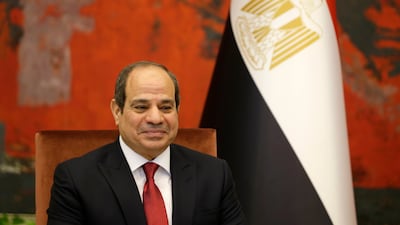Egypt is increasing the number of beneficiaries of government programmes designed to cushion its neediest against the economic impact of the Ukraine war.
President Abdel Fattah El Sisi's office said one million families would be added to a state programme that provides cash transfers, bringing the total number of beneficiaries to more than 20 million.
The “Solidarity and Dignity” programme, which began in 2015 and is funded by the World Bank, pays poor families a minimum of 350 Egyptian pounds ($18.50) a month.
Another nine million families will receive financial aid for the next six months at a total cost of one billion pounds.
Beneficiaries will include retirees whose monthly pension is less than 2,500 pounds ($130) and state employees whose salaries are below 2,700 pounds ($142), Mr El Sisi's office said.
The distribution of food packages sold at half price at army outlets would also be expanded, with two million of them offered for sale every month, the president's office said.
The decision to expand these social safety net programmes was decided in a meeting on Tuesday between Mr El Sisi and the ministers of supply, finance and social solidarity. It follows another government measure, to boost domestic production of wheat to improve food security.
The fallout from the Russia-Ukraine war has had a devastating impact on Egypt’s economy, catching the most populous Arab nation at a time when it was slowly recovering from the slowdown caused by the coronavirus pandemic.
The country has to import crude oil and refined fuel, whose prices have increased since the start of the conflict, after some countries joined a boycott of Russian oil exports.
Prices of basic food, including wheat and other staple grains, have also soared after Ukrainian exports through the Black Sea were curtailed due to the war.
Egypt’s annual inflation has risen to above 13 per cent and the country is again seeking the support of the International Monetary Fund.
The country’s vital tourism industry was also hit by the Ukraine-Russia war, which halted the arrival of tourists from the two warring nations.
Russians and Ukrainians accounted for more than 30 per cent of all visitors before the war.











